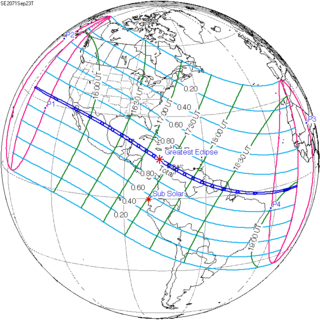| Solar eclipse of September 23, 2071 | |
|---|---|
| Type of eclipse | |
| Nature | Total |
| Gamma | 0.262 |
| Magnitude | 1.0333 |
| Maximum eclipse | |
| Duration | 191 s (3 min 11 s) |
| Coordinates | 14°12′N 76°42′W / 14.2°N 76.7°W |
| Max. width of band | 116 km (72 mi) |
| Times (UTC) | |
| Greatest eclipse | 17:20:28 |
| References | |
| Saros | 145 (25 of 77) |
| Catalog # (SE5000) | 9668 |
A total solar eclipse will occur at the Moon's ascending node of orbit on Wednesday, September 23, 2071,[1] with a magnitude of 1.0333. A solar eclipse occurs when the Moon passes between Earth and the Sun, thereby totally or partly obscuring the image of the Sun for a viewer on Earth. A total solar eclipse occurs when the Moon's apparent diameter is larger than the Sun's, blocking all direct sunlight, turning day into darkness. Totality occurs in a narrow path across Earth's surface, with the partial solar eclipse visible over a surrounding region thousands of kilometres wide. Occurring about 2.5 days before perigee (on September 21, 2071, at 5:10 UTC), the Moon's apparent diameter will be larger.[2]
The path of totality will be visible from parts of northern Mexico, northern Colombia, Venezuela, Guyana, far northern Brazil, Suriname, and French Guiana. A partial solar eclipse will also be visible for parts of Hawaii, North America, Central America, the Caribbean, northern and central South America, and West Africa.
- ^ "September 23, 2071 Total Solar Eclipse". timeanddate. Retrieved 21 August 2024.
- ^ "Moon Distances for London, United Kingdom, England". timeanddate. Retrieved 21 August 2024.
